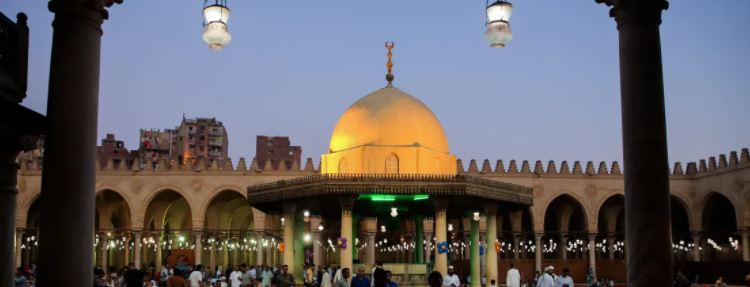The highlight of the Islamic year, Ramadan can be a great time to explore Egypt. Some travelers are concerned that what they can see and do in Egypt will be limited by visiting during Ramadan, however, it is an excellent opportunity to experience the traditions and culture of the country.
Furthermore, Egyptians are particularly generous during this holy month, one of the most common greetings during the period is Ramadan Karim, meaning ‘have a generous Ramadan’.
Tourists can find information below about when Ramadan takes place, how the festival is celebrated in Egypt and what travelers should take into consideration when traveling during Ramadan.
Everyone planning to travel to Egypt should first check the Egypt visa requirements for their country.
When is Ramadan in 2023?
Ramadan is the 9th month of the Islamic calendar. As this is a lunar calendar (meaning that it’s based on the phases of the moon) the 12 months add up to 354 days, 11 days fewer than the Georgian calendar.
For this reason, the date of Ramadan moves backward by 11 days each year in relation to the Georgian calendar.
In 2020 Ramadan begins on the evening of Thursday, April of 23rd and lasts for 30 days until sundown on Saturday 23rd of May. Islamic holidays always begin and end at sundown.
As Ramadan is in April in 2020, it falls within the period considered to be the best time of year to visit Egypt. Peak season in Egypt runs from October to May, avoiding the hottest summer temperatures.
What Happens During Ramadan?
Ramadan marks the month that the Muslim holy book, the Qu’ran, was first revealed to the Prophet Muhammad.
Muslims fast during daylight hours throughout the whole month of Ramadan. This means that they do not eat or drink anything in the hours of sunlight. Instead, one meal is eaten right after sunset (iftar) and another just before sunrise (suhoor). Other bad habits, such as smoking, are also given up during Ramadan.
Fasting is considered a spiritual exercise, by experiencing hunger and thirst participants are reminded of their fragility and also learn to be more compassionate towards the poor.
Most people will try to read the Qu’ran at least once during the month as Muslims concentrate on their relationship with God, including extra prayer.
What is Eid al-Fitr?
Eid al-Fitr is the ‘Festival of Breaking the Fast’ and is the celebration that marks the end of the month of Ramadan. This festival traditionally lasts 3 days and is a joyful family occasion.
Travelers in Egypt can experience mass prayers that take place at the beginning of Eid al-Fitr. Many Muslims then head to public parks and gardens to celebrate with family members. Some popular locations include:
- Giza Zoo, the zoo reported that some 72,000 people visited the attraction on the first day of Eid in 2019
- Fustat garden, the largest man-made park in Cairo.
Gifts are exchanged during Eid al-Fitr and people feast with their families, especially on sweet food. Traditional dishes are prepared during the Eid celebrations, in particular, the Egyptian Fattah, a meal of bread, rice, tomato sauce, and meat.
Is everyone required to fast during Ramadan?
Fasting is one of the 5 pillars of Islam and all followers are required to take part each year. There are, however, some exceptions. Believers can avoid fasting if they are:
- Pregnant or nursing
- Menstruating
- Traveling
Young children and the elderly are also not obliged to fast.
Non-Muslims (locals and foreign visitors alike) are not required to fast. However, the courtesy and respect shown by not consuming food or drink in front of the fasting population is greatly appreciated.
Tourism in Egypt During Ramadan
Muslims should not avoid work or school during the month of Ramadan, although some businesses reduce working hours. This means that tourists can enjoy most of the usual services available throughout the rest of the year.
Some historic sites may close earlier than usual, tourists should check timetables in advance. Also, although many restaurants in tourist areas will remain open, those away from these resorts might not open until later in the evening or remain closed.
What to see and do in Egypt during Ramdan
- See the streets and homes decorated with Fanoos, or Ramadan lanterns
- Enjoy Cairo and other cities at their most peaceful, people retire to their homes at sunset to eat and pray
- Taste a traditional iftar dinner at a local restaurant and experience the festivity
- Visit El Moez Street in the evening, a historic street that takes on a special charm during the quiet nights of Ramadan
What Documentation is required to Travel to Egypt?
Travelers in Egypt for Ramadan must meet the visa and documentation requirements for their country. Most foreign nationals are required to obtain a tourist visa for Egypt.
People from eligible countries can now access to the Egypt eVisa application. This online process is quick and easy as applicants can avoid long lines at the airport and are not required to visit an embassy or consulate in person.
Both single-entry and multiple-entry eVisas are available. Single-entry visas allow for stays of up to 30 days whilst multiple-entry visas allow for an unlimited number of entries across a period of 180 days. The total number of days per stay cannot exceed 30 days.






 |
|  |
|  |
|  |
| 